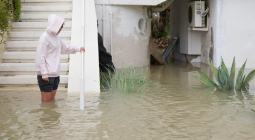24 dead, houses submerged in water… Abidjan and the ritual of flooding
Once again, the school holiday period is not looking good for many households in Abidjan, Ivory Coast. The cause is the torrential rain that is battering several towns, resulting in devastating and deadly floods. We take a look back at the damage, the factors involved and the ways in which this phenomenon can help to build resilience.
It’s almost routine in Ivory Coast. Every year at the same time, several towns are hit by torrential rains that are followed by flooding. The most devastating and deadly are always recorded in Abidjan, the economic heart of the country. The most recent episode at the end of June killed at least 24 people, including brothers who were swept away by the waters while playing on a playground.
Adjamé, Bingerville, Cocody, Yopougon and Abobo – none of the main communes escaped the violent downpours (up to 200 mm), which caused material and environmental damage such as the collapse of a building, landslides, disruptions to the road network, the weakening of urban biodiversity and houses submerged in water. “We rescued and brought to safety 227 victims, of whom 205 were brought to safety and 17 evacuated to hospitals”, said the Groupement des sapeurs-pompiers militaires (GSPM).
While some environmentalists cite climate change as the main cause of the flooding, others point the finger at geography and topography. Such is the case of Karamoko Vadiawè. “Abidjan is not only in a low-lying region, but also a flat region. You also need to bear in mind that the city is built on plains and natural wetlands that can be easily flooded if the volume of water rises rapidly. There’s also unplanned urbanisation, which explains this recurring phenomenon”, explains the civil protection specialist to our Voice of America (VOA) colleagues.
All hopes of resilience turned to the Paru
In response to the risk of flooding, which not only affects the quality of life of Ivorians, but also the attractiveness of Ivory Coast as a tourist destination, a number of initiatives are already under way. The most recent of these is the Urban Sanitation and Resilience Project (Paru), launched by the Ivorian government with the aim of rehabilitating the sewerage networks for the evacuation of rainwater.
The work will involve the construction of primary and secondary drainage networks and facilities for the treatment, elimination and recovery of solid waste that clogs up the roads. Benefits are expected in Abidjan, Jacqueville, Bouaké, Korhogo, Duékoué, San-Pédro, Daloa and the capital Yamoussoukro. The project is being financed to the tune of $315 million by the World Bank. It will run from 12 June 2020 to 31 October 2026, a period of six years.
Cover photo: By AFRIK 21



